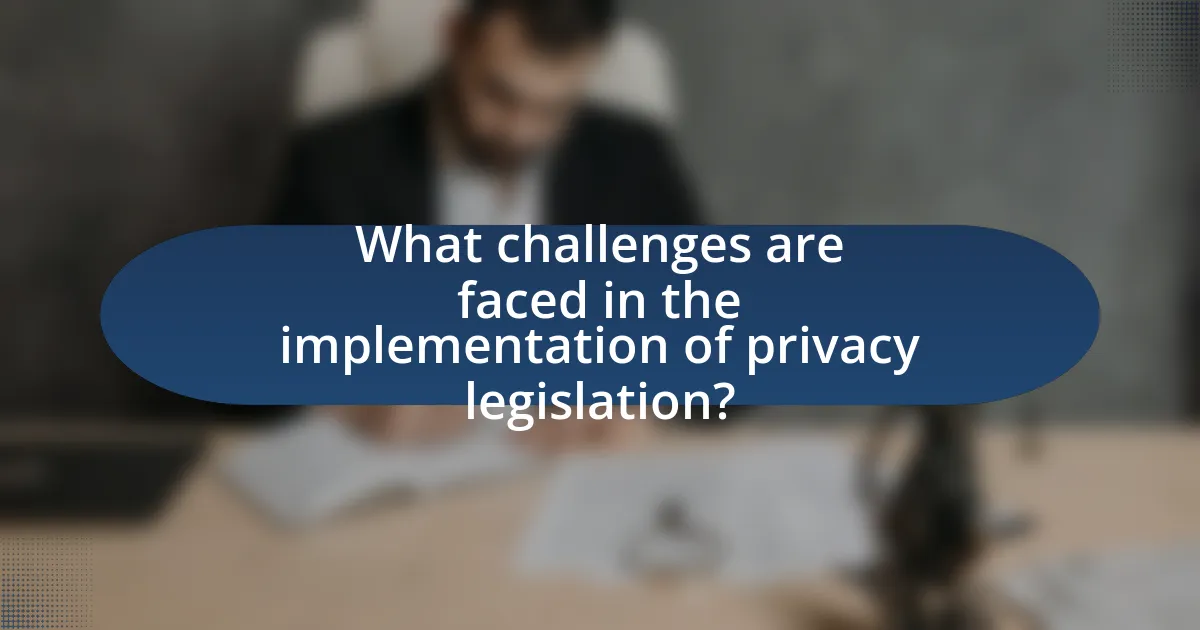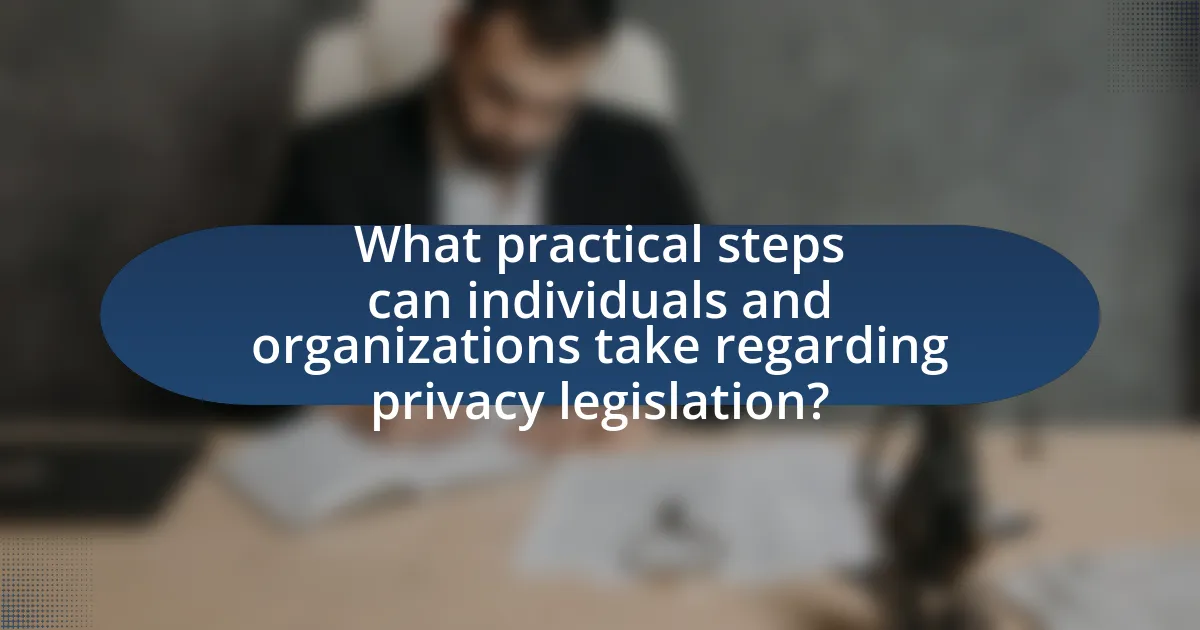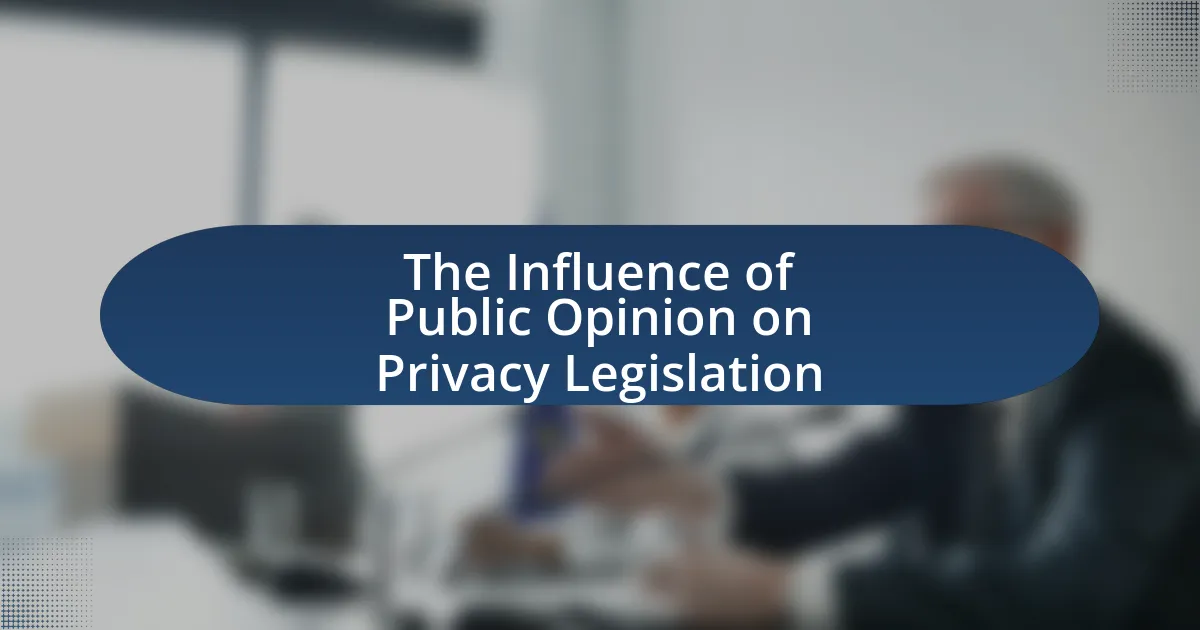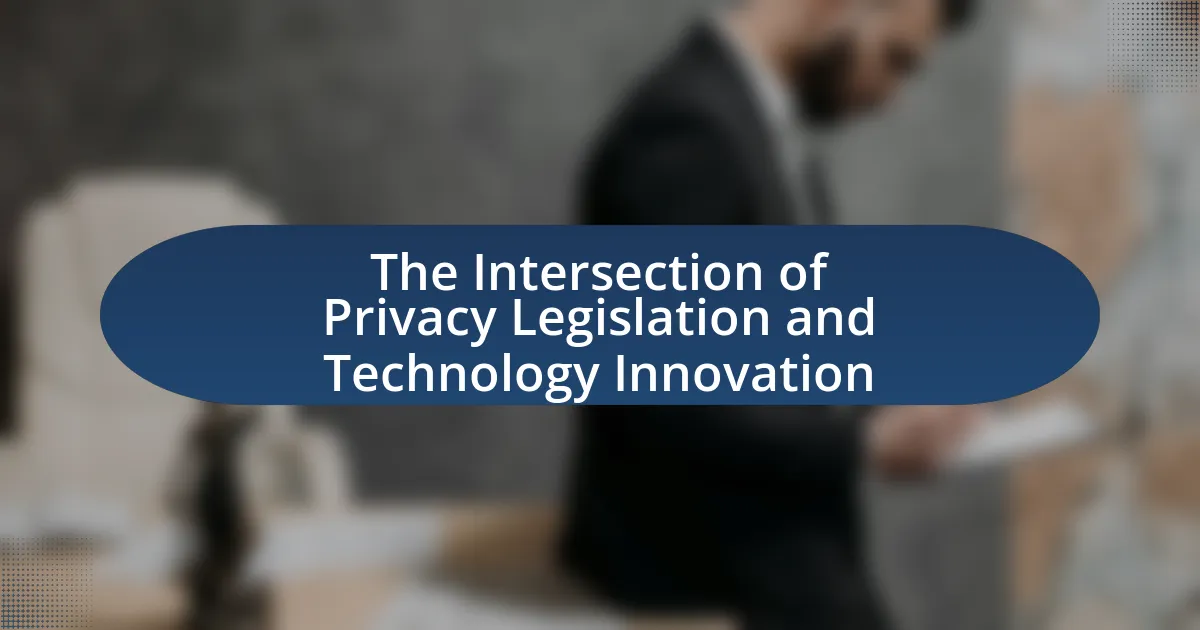The article focuses on the future of privacy legislation, highlighting key trends that are shaping this evolving landscape. It discusses the rise of comprehensive data protection laws, increased regulatory scrutiny, and the emphasis on consumer rights, exemplified by frameworks like the General Data Protection Regulation (GDPR). The influence of technological advancements, particularly artificial intelligence and data encryption, on privacy laws is examined, along with the impact of global movements and international agreements on national legislation. Additionally, the article addresses emerging privacy rights, compliance challenges, and the role of public perception and media in shaping privacy concerns, providing a comprehensive overview of the current and future state of privacy legislation.

What are the key trends shaping the future of privacy legislation?
Key trends shaping the future of privacy legislation include the rise of comprehensive data protection laws, increased regulatory scrutiny, and the growing emphasis on consumer rights. Comprehensive data protection laws, such as the General Data Protection Regulation (GDPR) in Europe, have set a precedent for similar legislation worldwide, influencing countries to adopt stricter privacy regulations. Increased regulatory scrutiny is evident as governments and regulatory bodies are actively monitoring compliance and imposing significant fines for violations, which underscores the importance of adherence to privacy standards. Additionally, there is a growing emphasis on consumer rights, with legislation increasingly focusing on giving individuals more control over their personal data, including rights to access, correction, and deletion of their information. These trends reflect a global shift towards prioritizing privacy and data protection in legislative frameworks.
How are technological advancements influencing privacy laws?
Technological advancements are significantly influencing privacy laws by necessitating more stringent regulations to protect personal data. The rise of digital technologies, such as artificial intelligence and big data analytics, has led to increased data collection and processing capabilities, prompting lawmakers to address the potential for misuse and breaches of personal information. For instance, the implementation of the General Data Protection Regulation (GDPR) in the European Union in 2018 was a direct response to the challenges posed by these advancements, establishing comprehensive guidelines for data protection and privacy rights. This regulatory framework has inspired similar legislation worldwide, reflecting a growing recognition of the need for robust privacy protections in the face of evolving technological landscapes.
What role does artificial intelligence play in privacy legislation?
Artificial intelligence plays a crucial role in shaping privacy legislation by influencing how data is collected, processed, and protected. AI technologies enable organizations to analyze vast amounts of personal data, which raises significant concerns regarding user consent and data security. For instance, the General Data Protection Regulation (GDPR) in Europe mandates that organizations must implement measures to ensure that AI systems comply with privacy rights, such as the right to explanation and data minimization. This regulatory framework reflects the need for transparency and accountability in AI applications, ensuring that individuals’ privacy is safeguarded in an increasingly data-driven world.
How is data encryption impacting legal frameworks?
Data encryption is significantly impacting legal frameworks by necessitating the adaptation of laws to address privacy and security concerns. As organizations increasingly rely on encryption to protect sensitive information, legal systems are challenged to balance the need for data protection with law enforcement’s access to information. For instance, the General Data Protection Regulation (GDPR) in Europe mandates that organizations implement appropriate security measures, including encryption, to safeguard personal data, thereby influencing compliance requirements and legal accountability. Additionally, the rise of encryption technologies has prompted discussions around legislation such as the proposed EARN IT Act in the United States, which seeks to establish standards for online platforms while considering encryption’s role in user privacy. These developments illustrate how encryption is reshaping legal frameworks to enhance data protection while addressing the complexities of law enforcement access.
What global movements are affecting privacy legislation?
Global movements affecting privacy legislation include the European Union’s General Data Protection Regulation (GDPR), which has set a global standard for data protection and privacy rights. The GDPR, enacted in 2018, influences legislation worldwide by encouraging countries to adopt similar frameworks to protect personal data. Additionally, the California Consumer Privacy Act (CCPA) has prompted other U.S. states to consider or implement their own privacy laws, reflecting a growing trend towards stronger consumer privacy protections. Furthermore, international discussions around data sovereignty and cross-border data flows are shaping how nations approach privacy legislation, as seen in the ongoing debates at forums like the United Nations and the Organisation for Economic Co-operation and Development (OECD). These movements collectively drive a shift towards more comprehensive and standardized privacy regulations globally.
How are international agreements shaping national laws?
International agreements are shaping national laws by establishing frameworks that countries adopt to ensure compliance with global standards. For instance, the General Data Protection Regulation (GDPR) enacted by the European Union has influenced privacy laws worldwide, prompting nations to revise their legislation to align with its stringent data protection requirements. This alignment is evident as countries like Brazil and Japan have implemented laws that reflect GDPR principles, demonstrating the direct impact of international agreements on national legal systems.
What is the impact of cross-border data flows on privacy regulations?
Cross-border data flows significantly impact privacy regulations by creating challenges for compliance and enforcement. As data moves across jurisdictions, differing legal frameworks can lead to conflicts, making it difficult for organizations to adhere to multiple regulations simultaneously. For instance, the European Union’s General Data Protection Regulation (GDPR) imposes strict data protection requirements, while other regions may have more lenient standards. This disparity can result in legal uncertainties and increased operational costs for businesses that operate internationally. Additionally, the rise of data localization laws in various countries further complicates the landscape, as these laws may require data to be stored and processed within national borders, potentially conflicting with existing cross-border data flow practices.
What are the emerging privacy rights being recognized?
Emerging privacy rights being recognized include the right to data portability, the right to be forgotten, and the right to privacy by design. The right to data portability allows individuals to transfer their personal data between service providers, enhancing user control over their information. The right to be forgotten enables individuals to request the deletion of their personal data from online platforms, reflecting a growing emphasis on individual autonomy. Privacy by design mandates that organizations incorporate privacy considerations into the development of their products and services from the outset. These rights are increasingly being codified in legislation, such as the General Data Protection Regulation (GDPR) in the European Union, which has set a precedent for privacy rights globally.
How are consumer rights evolving in the digital age?
Consumer rights are evolving in the digital age through enhanced protections and regulations aimed at safeguarding personal data and privacy. Legislative frameworks such as the General Data Protection Regulation (GDPR) in Europe and the California Consumer Privacy Act (CCPA) in the United States have established clear rights for consumers, including the right to access, delete, and control their personal information. These regulations reflect a growing recognition of the importance of consumer autonomy and data security in an increasingly digital marketplace. Additionally, trends indicate a shift towards more comprehensive privacy laws globally, as governments respond to consumer demand for greater transparency and accountability from businesses regarding data handling practices.
What new rights are being proposed in various jurisdictions?
Various jurisdictions are proposing new rights focused on enhancing individual privacy and data protection. For instance, the European Union is considering the introduction of a “right to digital self-determination,” which would empower individuals to control their personal data more comprehensively. Similarly, California’s Consumer Privacy Act (CCPA) has inspired other states to propose similar legislation that includes rights such as data access, deletion, and the ability to opt-out of data sales. These proposals reflect a growing trend towards recognizing and formalizing privacy rights in response to increasing public concern over data misuse and surveillance.

What challenges are faced in the implementation of privacy legislation?
The implementation of privacy legislation faces several challenges, including compliance complexity, varying international standards, and technological advancements. Compliance complexity arises as organizations must navigate intricate legal requirements, which can differ significantly across jurisdictions. For instance, the General Data Protection Regulation (GDPR) in Europe imposes strict rules that may conflict with less stringent regulations in other regions, complicating global operations. Additionally, varying international standards create difficulties for multinational companies that must adhere to multiple legal frameworks simultaneously. Technological advancements further complicate implementation, as rapid changes in data collection and processing methods can outpace existing legislation, making it challenging to enforce compliance effectively. These factors collectively hinder the successful implementation of privacy laws.
How do businesses adapt to changing privacy laws?
Businesses adapt to changing privacy laws by implementing comprehensive compliance programs that include regular audits, employee training, and updates to privacy policies. These programs ensure that organizations stay informed about new regulations, such as the General Data Protection Regulation (GDPR) and the California Consumer Privacy Act (CCPA), which impose strict requirements on data handling and consumer rights. For instance, a survey by the International Association of Privacy Professionals (IAPP) found that 70% of organizations have increased their investment in privacy compliance since the introduction of GDPR in 2018. This proactive approach helps businesses mitigate legal risks and build consumer trust by demonstrating a commitment to data protection.
What are the compliance costs associated with new regulations?
Compliance costs associated with new regulations typically include expenses related to legal consultations, technology upgrades, employee training, and ongoing monitoring and reporting. For instance, a study by the Regulatory Flexibility Act (RFA) indicates that small businesses can incur compliance costs averaging $12,000 annually per employee due to new regulations. These costs can vary significantly based on the complexity of the regulations and the size of the organization, with larger firms often facing higher total costs due to more extensive operational changes required.
How do companies balance privacy with innovation?
Companies balance privacy with innovation by implementing robust data protection measures while fostering a culture of transparency and user consent. For instance, organizations often adopt privacy-by-design principles, integrating privacy features into their product development processes, which allows them to innovate without compromising user data security. According to a 2021 report by the International Association of Privacy Professionals, 70% of companies that prioritize privacy see it as a competitive advantage, demonstrating that effective privacy practices can coexist with innovative strategies.
What enforcement mechanisms are being established?
Enforcement mechanisms being established include increased regulatory oversight, penalties for non-compliance, and the establishment of dedicated enforcement agencies. Regulatory bodies are being empowered to impose fines and sanctions on organizations that fail to adhere to privacy laws, as seen in the implementation of the General Data Protection Regulation (GDPR) in Europe, which allows for fines up to 4% of annual global turnover. Additionally, many jurisdictions are creating specialized agencies to monitor compliance and investigate breaches, enhancing the ability to enforce privacy legislation effectively.
How are penalties for non-compliance evolving?
Penalties for non-compliance are becoming increasingly stringent as privacy legislation evolves. Regulatory bodies are imposing higher fines and more severe consequences for violations, reflecting a growing emphasis on data protection. For instance, the General Data Protection Regulation (GDPR) allows fines up to 4% of a company’s global revenue or €20 million, whichever is higher, which has led to significant financial repercussions for non-compliant organizations. Additionally, jurisdictions are expanding the scope of enforcement, with more agencies actively monitoring compliance and pursuing legal actions against violators. This trend indicates a shift towards a more proactive and punitive approach to ensure adherence to privacy laws.
What role do regulatory bodies play in enforcement?
Regulatory bodies play a crucial role in enforcement by establishing and implementing compliance standards for privacy legislation. These organizations, such as the Federal Trade Commission in the United States or the European Data Protection Board in the EU, monitor adherence to laws, investigate violations, and impose penalties for non-compliance. For instance, the General Data Protection Regulation (GDPR) empowers regulatory bodies to fine companies up to 4% of their annual global turnover for breaches, thereby ensuring accountability and protecting consumer rights. This enforcement mechanism is essential for maintaining trust in data handling practices and promoting adherence to privacy standards across industries.
What public perceptions influence privacy legislation?
Public perceptions that influence privacy legislation include concerns about data security, trust in technology companies, and awareness of personal data rights. These perceptions shape legislative priorities as lawmakers respond to public demand for stronger protections against data breaches and misuse. For instance, a 2021 survey by the Pew Research Center found that 79% of Americans are concerned about how their data is collected and used by companies, prompting calls for more stringent regulations like the California Consumer Privacy Act. Additionally, growing awareness of high-profile data breaches has heightened public scrutiny, leading to increased advocacy for comprehensive privacy laws that reflect societal values regarding individual rights and data protection.
How does public awareness affect legislative changes?
Public awareness significantly influences legislative changes by shaping public opinion and mobilizing collective action. When citizens are informed about specific issues, such as privacy concerns, they are more likely to advocate for legislative reforms. For instance, the Cambridge Analytica scandal in 2018 heightened public awareness about data privacy, leading to increased demands for stricter regulations, which prompted lawmakers to propose and enact measures like the California Consumer Privacy Act (CCPA). This demonstrates that heightened public awareness can directly result in legislative action aimed at addressing the concerns raised by the populace.
What role does media play in shaping privacy concerns?
Media plays a crucial role in shaping privacy concerns by influencing public perception and awareness of privacy issues. Through investigative journalism, news coverage, and social media discussions, media outlets highlight incidents of data breaches, surveillance, and misuse of personal information, which raises awareness among the public. For instance, the Cambridge Analytica scandal, widely reported in major media outlets, significantly increased public scrutiny regarding data privacy and led to calls for stronger privacy regulations. This coverage not only informs the public but also pressures lawmakers to address privacy concerns through legislation, as seen in the implementation of the General Data Protection Regulation (GDPR) in Europe, which was partly a response to heightened public awareness driven by media reporting.

What practical steps can individuals and organizations take regarding privacy legislation?
Individuals and organizations can take several practical steps regarding privacy legislation, including conducting regular privacy audits to assess compliance with existing laws. These audits help identify gaps in data protection practices and ensure adherence to regulations such as the General Data Protection Regulation (GDPR) and the California Consumer Privacy Act (CCPA). Additionally, implementing robust data protection policies and training employees on privacy best practices are essential steps. For instance, organizations can establish clear protocols for data handling and breach response, which are critical for minimizing risks associated with data privacy violations. Furthermore, staying informed about emerging privacy laws and trends, such as the increasing focus on consumer rights and data portability, enables proactive adjustments to privacy strategies. This approach is supported by the fact that organizations that prioritize compliance can avoid significant fines and reputational damage, as evidenced by the over $1.5 billion in fines imposed under GDPR since its enforcement in 2018.
How can individuals protect their privacy rights?
Individuals can protect their privacy rights by utilizing strong passwords, enabling two-factor authentication, and being cautious about sharing personal information online. Strong passwords reduce the risk of unauthorized access, while two-factor authentication adds an extra layer of security, making it harder for intruders to compromise accounts. Additionally, individuals should regularly review privacy settings on social media and other online platforms to control who can access their information. According to a 2021 study by the Pew Research Center, 81% of Americans feel that the potential risks of companies collecting their personal data outweigh the benefits, highlighting the importance of proactive privacy measures.
What tools are available for personal data protection?
Tools available for personal data protection include encryption software, virtual private networks (VPNs), password managers, and data loss prevention (DLP) solutions. Encryption software, such as VeraCrypt, secures data by converting it into a coded format, making it unreadable without the correct decryption key. VPNs, like NordVPN, create a secure tunnel for internet traffic, protecting user privacy by masking IP addresses. Password managers, such as LastPass, help users generate and store complex passwords securely, reducing the risk of unauthorized access. DLP solutions, like Symantec DLP, monitor and protect sensitive data from unauthorized sharing or breaches. These tools collectively enhance personal data security by addressing various vulnerabilities in data handling and transmission.
How can individuals stay informed about their rights?
Individuals can stay informed about their rights by regularly consulting official government websites, legal aid organizations, and advocacy groups that focus on civil rights and privacy issues. These sources provide up-to-date information on laws, regulations, and changes in privacy legislation. For instance, the U.S. Department of Justice and the American Civil Liberties Union offer resources that outline individual rights and recent legal developments. Additionally, subscribing to newsletters from these organizations can ensure timely updates on relevant legal changes and rights protections.
What best practices should organizations adopt for compliance?
Organizations should adopt a comprehensive compliance framework that includes regular risk assessments, employee training, and clear data governance policies. Regular risk assessments help identify vulnerabilities and ensure that organizations are aware of their compliance obligations, which is crucial given the evolving nature of privacy legislation. Employee training ensures that all staff understand their roles in maintaining compliance and the importance of data protection, as studies show that human error is a leading cause of data breaches. Clear data governance policies establish guidelines for data collection, storage, and sharing, which are essential for adhering to regulations such as the General Data Protection Regulation (GDPR) and the California Consumer Privacy Act (CCPA). These best practices collectively enhance an organization’s ability to navigate the complexities of privacy legislation effectively.
How can businesses implement effective privacy policies?
Businesses can implement effective privacy policies by conducting thorough data assessments to identify what personal information they collect, how it is used, and who it is shared with. This foundational step ensures compliance with regulations such as the General Data Protection Regulation (GDPR) and the California Consumer Privacy Act (CCPA), which mandate transparency and accountability in data handling.
Following the assessment, businesses should develop clear, accessible privacy policies that outline their data practices, including user rights and options for data control. Regular training for employees on privacy practices and the importance of data protection is essential to foster a culture of compliance.
Additionally, businesses must establish mechanisms for monitoring and auditing data practices to ensure ongoing compliance and adapt to evolving regulations. According to a 2021 report by the International Association of Privacy Professionals (IAPP), organizations that actively engage in privacy management see a 30% reduction in data breaches, highlighting the effectiveness of robust privacy policies.
What training should employees receive on privacy matters?
Employees should receive training on data protection regulations, data handling best practices, and the importance of confidentiality. This training should cover specific laws such as the General Data Protection Regulation (GDPR) and the California Consumer Privacy Act (CCPA), which mandate that organizations protect personal data and inform individuals about their rights. Additionally, employees should learn about the organization’s privacy policies, the consequences of data breaches, and how to recognize phishing attempts. Research indicates that organizations with comprehensive privacy training programs experience fewer data breaches and better compliance with privacy laws, highlighting the effectiveness of such training in mitigating risks.
What resources are available for understanding privacy legislation?
Resources available for understanding privacy legislation include government websites, legal databases, academic journals, and privacy advocacy organizations. Government websites, such as the Federal Trade Commission (FTC) and the European Data Protection Board (EDPB), provide official guidelines and updates on privacy laws. Legal databases like Westlaw and LexisNexis offer access to case law and legal analyses. Academic journals, such as the Journal of Privacy and Confidentiality, publish peer-reviewed articles on privacy issues. Additionally, organizations like the Electronic Frontier Foundation (EFF) and the International Association of Privacy Professionals (IAPP) offer educational materials and training on privacy legislation. These resources collectively provide comprehensive insights into the evolving landscape of privacy laws.
Where can individuals find reliable information on privacy laws?
Individuals can find reliable information on privacy laws through government websites, legal databases, and reputable organizations focused on privacy advocacy. Government websites, such as those of the Federal Trade Commission (FTC) in the United States or the Information Commissioner’s Office (ICO) in the UK, provide official guidelines and updates on privacy regulations. Legal databases like Westlaw and LexisNexis offer comprehensive access to case law and statutes related to privacy. Additionally, organizations such as the Electronic Frontier Foundation (EFF) and the International Association of Privacy Professionals (IAPP) publish resources and analyses that help individuals understand current trends and changes in privacy legislation.
What organizations provide support for privacy advocacy?
Organizations that provide support for privacy advocacy include the Electronic Frontier Foundation (EFF), the American Civil Liberties Union (ACLU), and Privacy International. The EFF focuses on defending civil liberties in the digital world, advocating for user privacy and free expression. The ACLU works to protect individual rights and liberties, including privacy rights, through litigation and public education. Privacy International campaigns globally to challenge government surveillance and promote data protection. These organizations are recognized for their significant contributions to privacy advocacy, influencing legislation and public policy.





